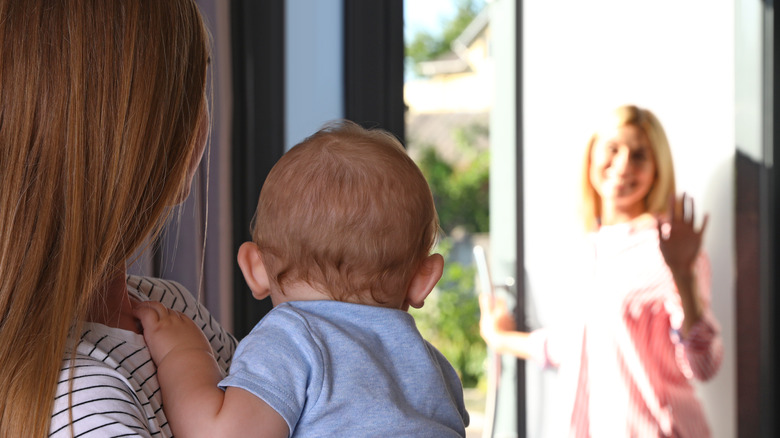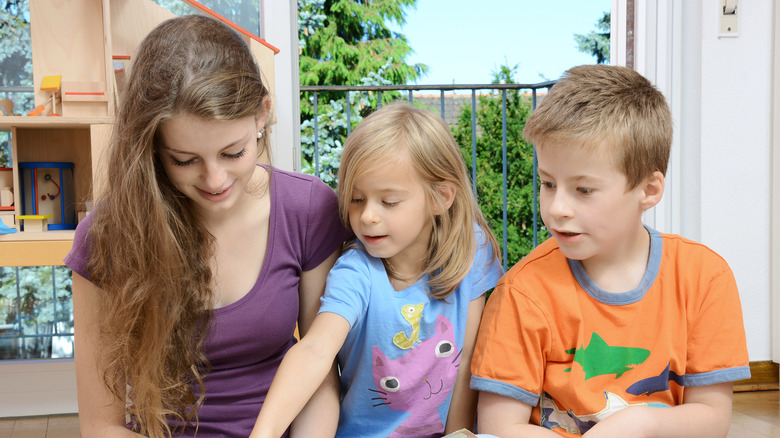Beware Of These Red Flags When Hiring A Babysitter
As a mother, one of the hardest things to do is to leave your child for the first time. If you don't have a friend, sibling, or partner who is able to take care of your child while you're away, you will probably need to hire a babysitter.
Choosing the right babysitter isn't always as easy as it might seem. In fact, it can often be pretty stressful. For one thing, some babysitters might suit some families better than others. After all, every family has its own needs and priorities. It's also hard to know how to judge someone from a quick interview. Even if a babysitter has good references, plenty of experience and a trustworthy demeanour, they might not always be the best choice for you and your family.
Of course, finding the best person is crucial when it comes to your children's babysitter, as they will be responsible for the safety and well-being of your children while you're away from home. Naturally, you'll want to find someone you can really trust in any potential scenario. So, we chatted to a few parenting and childcare experts to bring you a few little-known red flags that you should keep in mind when going through the process of interviewing and choosing a babysitter for your kids.
Your babysitter is too young
Back in the day, parents often left their children with pretty young sitters. Whether it was the older sibling or a neighbour's child, babysitters were sometimes as young as 10 or 11 years old. These days, this is far less common, and for a good reason.
It's important to hire a baby sitter who you can trust in all kinds of unexpected situations — someone who is old enough to problem-solve, take responsibility, and use their lived experience to make good decisions. In other words, age does matter when it comes to babysitters.
"If your babysitter is under 16 think twice," Kimberly King, a parenting expert, author and founder of Tough Topics Mom, tells us at The List. Even though younger teenagers may seem reliable and mature for their age, they might not always have the tools to keep your children out of harm's way. "It may be hard for young teenagers to watch young children and keep them safe," says King. "Be aware of the laws in your state."
Your babysitter hasn't had the right experience
While you may be tempted to hire a babysitter who is relatively new to the job, it's usually best to opt for someone who has had plenty of experience. With practice comes confidence and skill, especially when it comes to child-minding. A babysitter who has taken care of lots of other children in their time will be more likely to be reliable, self-sufficient and confident with your children.
Of course, some parents might have different requirements when it comes to experience — and lots of experience isn't always a guarantee of a good fit. "Being realistic about your care priorities is a helpful exercise in evaluating a sitter's capabilities," says Jada Rashawn, a nanny expert at Sittercity. "For example, while a younger sitter with less experience might not be a fit for evening hours, they could be a great candidate for a supervised mother's helper position, particularly if they come with a trusted recommendation and clear passion for childcare. Alternately, a seasoned sitter with a years-long resume could seem like a great candidate, but ultimately might not be a match if their experience isn't aligned to your family's needs, particularly when it comes to ages and schedules."
And remember, experience comes in many shapes and sizes: Usually (but not always), it means experience babysitting for other families. "A babysitter with younger siblings may have the right experience," says King. "But, ideally you are looking for a babysitter that has professional experience and non-family references. You want your sitter to have first aid, CPR training and have positive references."
Your babysitter doesn't speak your language
Even if a potential babysitter seems like a lovely, experienced candidate, if they don't have a decent understanding of English, they may not be the best fit. "Communication is key when it comes to caring for children, particularly between the caregiver and parent," warms Rashawn. "Effectively sharing and receiving information is crucial to building a strong relationship with your sitter, which requires trust earned through open, upfront communication. The absence of clear channels for exchanges could create hurdles, making something as simple as discussing schedules, rates, duties and responsibilities difficult, let alone more nuanced discussions about care concerns or child-specific challenges."
It can also cause problems for your children. If your kids can't communicate with their babysitter, they won't be able to let them know if something goes wrong. "Also, in an emergency a person who doesn't speak your language may be easily frustrated with your kids and won't be able to communicate in a crisis," says King.
Your babysitter seems nervous around your kids
A few nerves or a bit of shyness is always normal when meeting new people. However, when it comes to your babysitter, they should ideally be outgoing and friendly with your children, rather than nervous.
With that said, if your babysitter seems nervous, don't immediately rule them out. "If a sitter seems tentative with your children, try to discern where the apprehension is rooted," suggests Rashawn. "It's okay for caregivers to ease their way into a child's world by taking baby steps in forming a relationship; however, it's important to recognize the difference between treading lightly to build trust and lacking confidence in ability to do the job."
King agrees that nerves aren't always a bad sign. "If a babysitter seems nervous around kids remember that this is a new person and watching kids is a big responsibility," she says. "It's ok to be a little nervous for the right reasons." But be sure to monitor their nerves to make sure it's just first day jitters rather than a more serious lack of confidence.
Your babysitter is unresponsive or hard to reach
When choosing a babysitter, pay close attention to how your candidates communicate with you in the lead up to the interview. Are they quick to respond to emails and texts? Or do they never seem to be around to answer their phones? This can all give you a hint of what you can expect once they have been hired. Ultimately, good communication skills matter.
"If your babysitter is hard to reach and doesn't call back that is a red flag," says King. "Babysitters, even experienced ones — have to stay in touch with the parents."
"Communication is key to the success of the parent-caregiver relationship. If your sitter is consistently unresponsive or evasive when trying to schedule n interview, they become unreliable, which dissolves trust with your family," warns Rashawn. An unresponsive babysitter canditate may end up being someone who cancels on you last minute further down the line. "Parents adjust their entire lives and make certain guarantees and commitments based on the support that they have outsourced for their childcare, so enlisting a reliable partner who respects your time and communication style is a must," she says.
Your babysitter arrives late
A babysitter who turns up to their interview or first meeting on time is always a good sign. Someone who is late — even for a good reason — might be a red flag.
"Promptness is important when it comes to the commitments made as caregivers, which includes making the proper arrangements (reliable transportation, allowing enough time for the commute) to arrive at the time the parents have requested," says Rashawn. "Of course, situations outside your control can arise occasionally, but if your caregiver is arriving late consistently, it conveys a lack of respect and reliability for your family and should be addressed as such."
Adds King, "Everyone can get stuck in traffic once in a while, but, you are looking for a dependable person to care for your kids. Lateness is a bad habit." Ask your potential sitter why they couldn't make it to the meeting on time and make your judgement based on their answer.
Your babysitter asks if they can bring alcohol or a friend
Ideally, you're looking for a sitter who will dedicate all of their attention to your child while they're working. After all, this is a job and it should be treated as such. However, some babysitters may think it's appropriate to have a drink or even a friend over after the child has been put to sleep. In most cases, this is a red flag.
"Generally, bringing alcohol to your workplace shows a lack of respect for not only your profession, but for those around you," says Rashawn. "In the case of a babysitter, it also shows that they do not value the safety of themselves nor the children in their care." King adds that asking to bring alcohol is a "huge" red flag that is potentially dangerous. "There should be no alcohol in the home when a babysitter is watching your kids," she says.
If a babysitter asks to bring a friend, this is also a potentially dangerous distraction — and a sign that your sitter isn't taking their job seriously.
Your babysitter has no references
When hiring a babysitter, references should be an essential part of the process. References from other families or from a babysitting agency help you make an informed decision about whether or not this sitter is reliable. After all, taking care of your children is a big responsibility.
"As a general rule, a parent should never hire a caregiver without professional references," Rashawn says. "Hearing from past employers is crucial to getting a clearer picture of the candidate's track record outside of just their experience — getting a previous family's interactions, observations and feedback will help determine if this person is a good fit for your own family." Rashawn works at Sittercity, which is an automated service that can actually run a reference check for you.
King agrees that professional reference are an absolute must. "Do not hire without references!" she says bluntly. "Babysitters need verified references, reference checks, in-depth interviews and an opportunity to be observed by you to see how they interact with your kids."
Your babysitter complains about her other families
Some babysitters may have valid complaints about difficult previous employers. However, if a potential sitter seems to have a problem with all of their old families, this might be a sign that it's actually them who has the problem. "Depending on the complaints, this can be a problem," King tells us. "Ask questions, monitor, guide and follow up." Listen to their complaints and assess for yourself whether or not it's an issue.
As Rashawn tells us, this type of complaining can also be a sign that the professional boundary has been crossed in the past. "The line between the personal and professional relationship of a family and a caregiver can sometimes be blurred: it's great to create a comfortable and familiar rapport, but it's crucial to remember that it's ultimately still a business partnership," she warns. "A babysitter who complains about a family they work with gives off the wrong impression, no matter how justified the complaint may be, as it signals a lack of maturity and professionalism."
Your babysitter won't get off their phone
These days, we are all a bit addicted to our phones. So, it may not come as a huge surprise if your sitter seems to constantly reach for their phone to start scrolling or texting. However, a sitter who can't put their phone down may be a red flag. After all, you wouldn't want your sitter to be staring at their phone rather than watching your kids.
If your sitter keeps glancing at their phone during the interview or during their first meeting with your children, it may be a sign that there is worse to come."Phones create a distraction for sitters, and could cause them to miss out on engaging with the child or staying vigilant about their safety," Rashawn says. "A quick check of a text message or occasional scroll through social media while the kids are napping isn't inherently a red flag, but be aware if there appears to be excess use that takes the sitter away from their duties."
King warns that a phone-addicted sitter may also be tempted to take pictures with your children unless they've been given express permission to do so. "A babysitter should NOT take pics of your kids or post anything online," she says.
Your babysitter has a messy or ill-kempt appearance
While it's important not to judge a book by its cover, sometimes, you can learn a lot about a person just from their appearance. While things like fashion sense and hair styles shouldn't influence your decision, other things like cleanliness and tidiness can actually tell you a lot about a person — especially a potential babysitter.
If a babysitting candidate shows up for their interview looking seriously unkempt and messy, this could be a sign that they will also be messy and sloppy while taking care of your child. On the hand, someone who is neat and well-organized might be more likely to show the same qualities while working.
Appearances aren't everything, but they also shouldn't be completely discounted. Take note of how each potential babysitter presents themselves and take this into consideration alongside their references and interview when making your final decision.
Your child doesn't seem to like the babysitter after their first meeting
Let's face it — your kids might not immediately love their new babysitter. After all, it's a new person who will be there when you are gone. They might be shy, confused or even unhappy when they first meet them. However, after a little while, they will hopefully begin to open up to their new sitter and enjoy spending time with them.
Pay close attention to your child's reaction to potential babysitters when they first meet. If your child takes a strong disliking to them, it might be a red flag. Even if the potential sitter is kind, reliable and has great references, if your child simply doesn't get along with them, you may find it's a struggle every time you leave the house. Plus, it's always nicer for everyone if your child and your sitter can get along and have fun while you're gone.
You have a bad gut instinct about your babysitter
In most cases, your gut instinct is always right. Sometimes, you may not be able to pinpoint exactly why a potential sitter is giving you a bad feeling — nevertheless, you should always listen to your gut. "If you have a bad instinct about a babysitter, listen to that feeling," says King. "Maternal instincts are rarely wrong and it is always better to air on the side of caution. When you get a bad feeling, this can be a sign you are picking up on something like negative energy or abuse."
Rashawn agrees that any bad feelings should never be ignored. "Always trust your gut, especially when it comes to your kids," she says. "Doing your homework by asking pointed questions, conferring with your support system and checking references is important in giving people a chance, but at the end of the day, if you still have a bad feeling, it's so important not to discount it."
Remember: If you're going to be leaving your child with a relative stranger, the last thing you want is for that person to someone who gives you a strange feeling — no matter how great their references may be.













